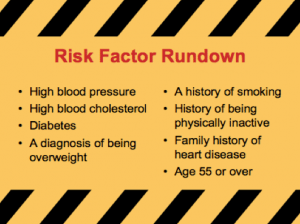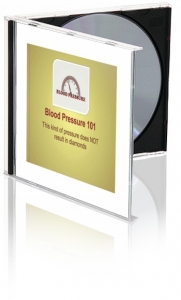Heart Disease Risk Factors
 It's National Blood Pressure Education Month, and there's no better time to assess your heart health. Determine your risk of heart disease by taking a closer look at all the factors involved...High Blood PressureBlood pressure is a measure of the way your blood presses on your arteries. When the pressure on your arteries is high, your heart has to work much harder than usual, which strains the muscle. It also makes it harder for oxygen to get to your heart because the blood that carries it is having a harder time getting through your arteries. Meanwhile, your artery walls harden in response to the constant high pressure. High blood pressure is also the main risk factor for congestive heart failure, which happens when your heart cannot pump enough blood to supply your body’s needs. Your blood pressure should be at 119/79 or less.High Blood CholesterolCertain foods can cause your body to produce excess cholesterol, which travels through your bloodstream in waxy packets called lipoproteins. LDL cholesterol, aka “bad” cholesterol, builds up in artery walls, while HDL cholesterol, aka “good” cholesterol, moves other cholesterols to your liver and out of your body. LDL buildup buildup is called plaque. The official medical name for plaque buildup is atherosclerosis. When plaque sticks to your arteries, it hardens their walls and narrows the space that blood uses to get around the body. If a clot gets stuck in a plaque-coated artery, it can cause a heart attack or a stroke. Reduced artery space also restricts the amount of oxygen-rich blood that can flow to your heart, which can cause angina, arrhythmias, and even heart failure. Keep your total cholesterol below 200 mg/dL, your LDL cholesterol at or below 100 mg/dL, and your HDL cholesterol above 40 mg/dL.DiabetesDiabetes happens when your body stops being able to process glucose correctly. This leads to high blood sugar. Diabetes can cause health complications that in turn endanger your heart. In fact, there is even a condition called diabetic heart disease, which develops in people with diabetes. According to the National Heart, Lung, and Blood Institute, “People who have type 2 diabetes have the same risk of heart attack and dying from heart disease as people who already have had heart attacks.” Having diabetes raises your overall risk of developing heart trouble, and it also makes it more likely that you will develop said heart trouble earlier and/or in a more severe form than other people (who don’t have diabetes) would.WeightWhy does being overweight or obese take a toll on your heart? Well, hauling around that extra weight is hard on your body. It can also be difficult to try to to process the foods that contribute to excess weight. These foods are often calorie-dense, nutrient-light options with too much saturated fat, trans fat, sodium, etc. Moreover, there are lifestyle factors that contribute to obesity -- like being inactive. All of this combines to put enormous strain on your body, which makes it harder for your systems to work properly.SmokingIf you or your loved ones smoke, you may be at a higher risk of heart disease. If you’re the smoker, then you should know that cigarette smoking causes coronary heart disease, which is the #1 cause of death in the U.S. Smoking also narrows your arteries, which causes poor circulation, while the chemicals in the smoke can hurt your heart and damage your blood vessels, leading to an increased risk of atherosclerosis. Smoking has also been linked to peripheral arterial disease. If you are surrounded by smokers, you also raise your risk of heart disease just by breathing secondhand smoke.InactivityDid you know that inactive people are nearly twice as likely to develop heart disease as active people? This is true even if you’re not facing any other heart disease risk factors. Plus, being inactive raises your risk for a host of other factors, like high blood pressure, obesity, diabetes, etc. Since these are further risk factors for heart disease, your risk simply increases as you remain inactive. Your body should move. Sitting around all day, every day, week after week, is quite bad for you. So get out there and get moving!Family HistoryIf members of your family have had heart disease, then your risk of heart disease also goes up. It’s especially serious if…
It's National Blood Pressure Education Month, and there's no better time to assess your heart health. Determine your risk of heart disease by taking a closer look at all the factors involved...High Blood PressureBlood pressure is a measure of the way your blood presses on your arteries. When the pressure on your arteries is high, your heart has to work much harder than usual, which strains the muscle. It also makes it harder for oxygen to get to your heart because the blood that carries it is having a harder time getting through your arteries. Meanwhile, your artery walls harden in response to the constant high pressure. High blood pressure is also the main risk factor for congestive heart failure, which happens when your heart cannot pump enough blood to supply your body’s needs. Your blood pressure should be at 119/79 or less.High Blood CholesterolCertain foods can cause your body to produce excess cholesterol, which travels through your bloodstream in waxy packets called lipoproteins. LDL cholesterol, aka “bad” cholesterol, builds up in artery walls, while HDL cholesterol, aka “good” cholesterol, moves other cholesterols to your liver and out of your body. LDL buildup buildup is called plaque. The official medical name for plaque buildup is atherosclerosis. When plaque sticks to your arteries, it hardens their walls and narrows the space that blood uses to get around the body. If a clot gets stuck in a plaque-coated artery, it can cause a heart attack or a stroke. Reduced artery space also restricts the amount of oxygen-rich blood that can flow to your heart, which can cause angina, arrhythmias, and even heart failure. Keep your total cholesterol below 200 mg/dL, your LDL cholesterol at or below 100 mg/dL, and your HDL cholesterol above 40 mg/dL.DiabetesDiabetes happens when your body stops being able to process glucose correctly. This leads to high blood sugar. Diabetes can cause health complications that in turn endanger your heart. In fact, there is even a condition called diabetic heart disease, which develops in people with diabetes. According to the National Heart, Lung, and Blood Institute, “People who have type 2 diabetes have the same risk of heart attack and dying from heart disease as people who already have had heart attacks.” Having diabetes raises your overall risk of developing heart trouble, and it also makes it more likely that you will develop said heart trouble earlier and/or in a more severe form than other people (who don’t have diabetes) would.WeightWhy does being overweight or obese take a toll on your heart? Well, hauling around that extra weight is hard on your body. It can also be difficult to try to to process the foods that contribute to excess weight. These foods are often calorie-dense, nutrient-light options with too much saturated fat, trans fat, sodium, etc. Moreover, there are lifestyle factors that contribute to obesity -- like being inactive. All of this combines to put enormous strain on your body, which makes it harder for your systems to work properly.SmokingIf you or your loved ones smoke, you may be at a higher risk of heart disease. If you’re the smoker, then you should know that cigarette smoking causes coronary heart disease, which is the #1 cause of death in the U.S. Smoking also narrows your arteries, which causes poor circulation, while the chemicals in the smoke can hurt your heart and damage your blood vessels, leading to an increased risk of atherosclerosis. Smoking has also been linked to peripheral arterial disease. If you are surrounded by smokers, you also raise your risk of heart disease just by breathing secondhand smoke.InactivityDid you know that inactive people are nearly twice as likely to develop heart disease as active people? This is true even if you’re not facing any other heart disease risk factors. Plus, being inactive raises your risk for a host of other factors, like high blood pressure, obesity, diabetes, etc. Since these are further risk factors for heart disease, your risk simply increases as you remain inactive. Your body should move. Sitting around all day, every day, week after week, is quite bad for you. So get out there and get moving!Family HistoryIf members of your family have had heart disease, then your risk of heart disease also goes up. It’s especially serious if…
- Your father or brother has a heart attack or heart disease diagnosis before age 55.
- Your mother or sister has a heart attack or heart disease diagnosis before age 65.
AgeYour risk of heart disease increases at and after age 45 for men and at and after age 55 for women. If plaque has been building up in your arteries, this is generally when the buildup has reached a point that causes health problems like coronary heart disease.The Bottom LineWhat changes are you going to make in order to reduce your risk of heart disease? Even one risk factor can put your heart in serious danger. So get informed and start taking steps to reduce your risk of heart disease.But wait, there's more! For guidance about heart disease prevention and foods that promote heart health, visit the Nutrition Education Store...




